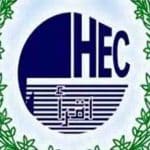Islamabad, July 19, 2023: The Higher Education Commission (HEC), Pakistan has unveiled its highly anticipated Graduate Education Policy 2023 (GEP-2023). The policy that marks a crucial milestone for higher education institutions in Pakistan is available at https://www.hec.gov.pk/site/gep. It is effective and applicable from Fall 2023 semester onwards.
Drawing upon the Commission’s extensive two-decade experience and feedback from academia, the new policy has been meticulously crafted to embody the core principles of university autonomy, flexibility, and quality assurance, while also upholding academic freedom, relevance, and originality.
One of the notable features of GEP-2023 is its liberal approach, which allows for intra-disciplinary admissions, enabling students to explore diverse academic fields within their chosen discipline. The policy recognises the value of both local and foreign expertise by introducing external evaluation conducted by indigenous Professors alongside foreign evaluators. This inclusive approach aims to ensure a comprehensive assessment of academic standards.
Furthermore, the policy demonstrates its flexibility by introducing relaxation to the CGPA requirements for admission and offering a more dynamic assessment of the time duration for degree completion. It also streamlines the process for determining faculty relevance, and the requirements for HEC’s NOC (No Objection Certificate) and approval to become a doctoral supervisor. The policy provides clear guidelines and suggests mechanisms to strengthen the implementation of these principles at the institutional level, ensuring consistency and transparency.
GEP-2023 recognises the significance of a rigorous and comprehensive degree obtaining process. It introduces detailed guidelines for conducting comprehensive examinations, writing doctoral dissertations, and interpreting similarity reports. These guidelines are designed to enhance academic standards, foster originality, and maintain the integrity and ethics of research and study within higher education institutions.
A key aspect of the new policy is its emphasis on doctoral research governance. It delineates the roles and responsibilities of supervisors, supervisees, and the departments overseeing advanced studies and research. By doing so, it aims to cultivate a culture of academic integrity and ethics while effectively managing academic grievances that may arise during the research process.
HEC firmly believes that the implementation of this policy will make a significant contribution to enhancing the quality of graduate programmes across the country. However, the successful realisation of these objectives depends upon committed support of the higher education community as a whole.
Overall, the policy is a progressive and forward-looking initiative that prioritises the improvement of graduate education in Pakistan. By promoting autonomy, flexibility, and quality assurance, the policy sets the stage for an enriched learning environment that fosters academic excellence and innovation.
Follow the PNI Facebook page for the latest news and updates.








